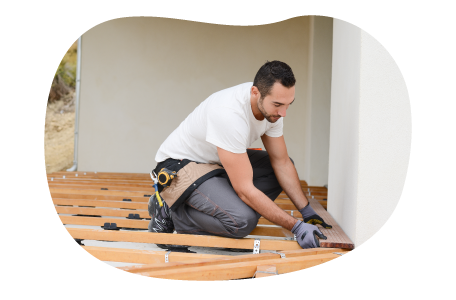
Why do floor installation contractors need insurance?
Working with tools in other people's homes and offices means high liability. Business insurance helps pay legal costs if a client trips on loose linoleum, or sues over damage in their home. It also covers stolen equipment, accidents in your company truck, and employee injuries.

Get same-day insurance
With Insureon, floor and carpet installers can get insurance coverage the same day they apply for quotes.
Fill out our easy online application to compare quotes from top-rated providers.
What types of insurance do flooring installation businesses need?
These insurance policies cover the most common risks of floor installation.
General liability insurance
This policy covers basic third-party risks, such as accidental damage to a client’s furniture while installing hardwood flooring. It may be required for a commercial lease, loan, or contract.
- Customer bodily injuries
- Customer property damage
- Product liability insurance
Business owner's policy
A business owner's policy, or BOP, is a cost-effective way for floor installers to buy general liability coverage and commercial property insurance together.
- Accidental damage to a customer's property
- Customer injuries
- Business property damage
Workers’ compensation insurance
Most states require workers' comp for flooring installation businesses with employees. It also protects sole proprietors from work-related medical bills that health insurance might deny.
- Medical expenses from work injuries
- Disability benefits
- Legal defense costs
Commercial auto insurance
This policy provides financial protection in the event of an accident involving your flooring company's vehicle. Each state has its own requirements for auto liability coverage.
- Property damage from an accident
- Medical costs from an accident
- Vehicle vandalism and theft
Contractor’s tools and equipment insurance
This type of coverage helps pay for repair or replacement of a contractor’s flooring nailers, miter saws, and other tools and equipment used at work sites. It's a type of inland marine insurance.
- Equipment less than five years old
- Equipment that travels to job sites
- Small tools
Cyber insurance
Cyber insurance helps cover the cost of a data breach or cyberattack at your flooring installation business. It's sometimes called cyber liability insurance or cybersecurity insurance.
- Data breach notification costs
- Fraud monitoring services
- Cyber incident investigations
How much does insurance cost for installation businesses?

Small business insurance usually costs less for a contractor than an installation business with several employees.
Factors that affect premiums include:
- Flooring installation services offered
- Whether you sell carpets or other products
- Business property and equipment
- Business income
- Types of insurance purchased
- Policy limits and deductibles
How do I get flooring contractor insurance?
It's easy to get insurance for flooring contractor businesses if you have your company information on hand. Our application will ask for basic facts about your company, such as revenue and number of employees. You can buy a policy online and get a certificate of insurance with Insureon in three easy steps:
- Complete a free online application
- Compare insurance quotes and choose policies
- Pay for your policy and download a certificate
Insureon's licensed insurance agents work with top-rated U.S. providers to find coverage that fits your flooring company, whether you're a small business owner, a contractor, or a subcontractor.
Verified business insurance reviews
Hear from customers like you who purchased small business insurance.
Common questions about flooring installers insurance
Review answers to frequently asked questions about flooring contracting business insurance policies.
What other types of coverage do flooring installation contractors need?
While general liability handles most common third-party risks, and workers' compensation financially protects you and your employees from work-related injuries and illnesses, there are additional insurance packages a flooring installation business should consider including in their risk management plan:
- Builder's risk insurance: Builder's risk provides coverage for a structure under construction, along with materials, such as floorboards, at a construction site. It's sometimes called course of construction insurance.
- Professional liability insurance: Also known as errors and omissions insurance, this policy covers the cost of legal fees in the event of client lawsuits over unsatisfactory work, including negligence.
- Commercial umbrella insurance: Umbrella insurance boosts the coverage on your general liability, commercial auto, and employer's liability insurance once the policy limit is reached.
- Products-completed operations coverage: Also called product liability insurance, this coverage provides protection against customer lawsuits over property damage or injury arising from your product or completed service.
Do flooring installation businesses need to obtain a license or certification?
The short answer is no. Most state laws do not require floor installers to obtain a license or certification in order to work. However, some local governments may have such requirements so it's important to check local laws and regulations.
Even when it's not required, licenses and certifications are a great way to stand out among your competitors and gain an edge on them. A licensed flooring contractor signals competence and trust to customers, and can help you secure more and bigger contracts.
In order to get a flooring contractor license, you generally need a certain amount of relevant work experience (usually 2-5 years), a completed application, and the successful passing of the licensure exam. You should check with your state's licensing board for more information on specific requirements.
Below are some organizations that provide training and certifications for floor installation companies and contractors:
Do I need installation floater coverage to protect my flooring installation equipment?
A standard commercial property insurance policy only covers business property located at the address on your insurance policy. It won't protect your flooring equipment and tools while they're in transit, at a work site, or stored off-site.
It's for this reason why your flooring installation business should get installation floater insurance, a type of inland marine coverage.
An installation floater insurance policy protects your flooring materials and products—such as tiles, laminate, carpet, hardwood flooring, mortar and nails—during the installation process. It also provides coverage when they're in transit from one work site to another, or stored off-site like at a client's home.
This coverage helps carpet installer and carpet fitter contractors, wood flooring installers, and other types of flooring installers avoid financial loss by paying for the repair of replacement of your flooring materials if they're damaged by a covered claim, such as vandalism or fire.
